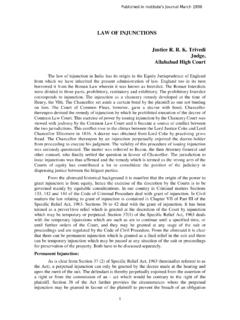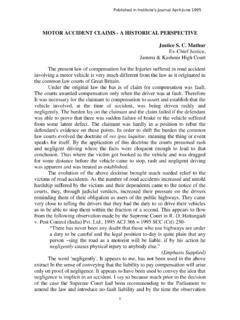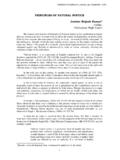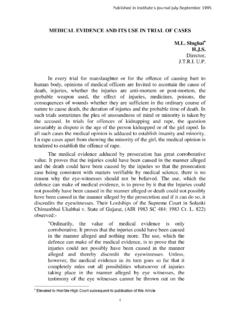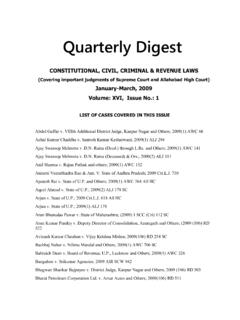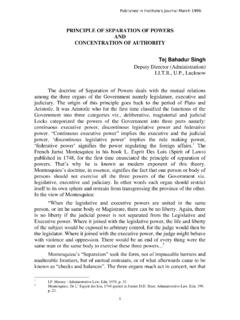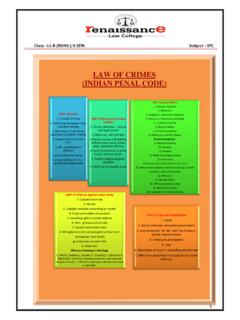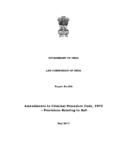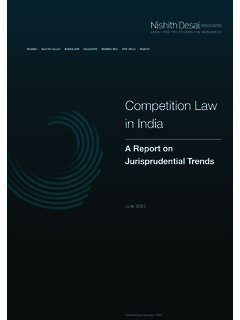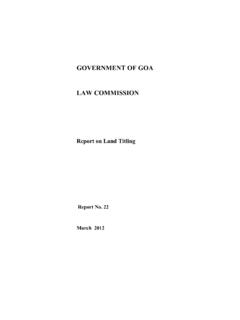Transcription of SCIENCE, TECHNOLOGY AND LAW P. M. Bakshi …
1 1 SCIENCE, TECHNOLOGY AND LAW P. M. Bakshi formerly member, Law commission of india The Inter-disciplinary approach For men and women who, in their daily life, pursue only one field of study it is refreshing to cross over its boundaries and to have a look at wider horizons. Such activities, covering as they do the boundaries of more than one discipline not only widen one's mental sweep, but also lend it depth and content. If science is the accumulated knowledge of centuries, law can be rightly described as collected wisdom of the ages. Men have risen above the animal level, very largely by means "technics", the use of tools and implements for better procuring the mate means of life. Similarly, when they have achieved a reasonably perfect lei system, they have risen on the intellectual plane. A legal system is intended represent a synthesis of conflicting interests. Knowledge of the material world; its purest form is science, and when put to practical use, it becomes TECHNOLOGY .
2 Wisdom, at the peak of its excellence. is the foundation of the ideal political system, and, when utilised to regulate human relationships, becomes law Herbert Spencer defined Science as organised Law could be described as the wisdom of organised society given expression in binding rule by the State. "Law is a form of order, and good law must necessarily mean good order", Aristotle s saying2 possesses as much validity today as when he wrote. SCIENCE AND LAW The points of similarity There are certain other points of similarity between science and law. For example, science itself is organised on the same basis as law. It has been said3 Art, in its legal significance, embraces every operation of human intelligence, whereby something is produced outside of nature; and the term 'science' includes all human knowledge which has been - generalised and systematised, and has obtained method, relations and the forms of law.
3 " 1 Herbert Spencer Education Chapter 2. 2 Aristotle, Politics, Book 7, Ch. 4, 3 Atchison & Co. v. 15 Court of Claims (per Davis J.); Sarkar Evidence (1971), page 496 4 YFPMWLIH MR -RWXMXYXI W .SYVREP .YP] 7 ITXIQFIV 2 In science, general principles are formulated on an observation of specific phenomena. So it is in common law. It was said long ago that a precedent embalms a The famous letter writer5 Junlus said that one precedent creates another, "They soon accumulate and become law". One need not therefore postulate a conflict between science and jurisprudence. Such has not been the experience of history. The two disciplines have flourished together, and have often been enriched by the same brilliant minds. For example, the golden age of Greek science the fifth and the fourth centuries before Christ was not only the golden age of Greek literature and art, but also the golden age of philosophic speculation.
4 The fourth century was dominated by two of the greatest personalities of their kind in the whole past. The earlier half was dominated by Plato: the second half by Aristotle. Plato not only speculated about political6 and legal topics,7 but was also a great lover of mathematics. On the portals of his Academy, were inscribed the words- Let them not enter here who do not know Geometry". Aristotle was not only a pioneer in the natural sciences; he also wrote extensively on constitutional and legal The life and writings of these two brilliant minds show that deep and extensive knowledge of the world of nature can reside together with insight into law, social sciences and jurisprudence. There is no anti-thesis between science and law. The progress of science Science in the twentieth century has become big, complex, and expensive. It has also become relevant to the ordinary lives of men to an unprecedented extent.
5 One could say, without too much exaggeration, that the course of history since the last quarter of the nineteenth century has been a story of increasing acceptance and incorporation of the scientific knowledge and scientists into the practical institutions of society, including both business and government. Science has become involved in our domestic politics, In international relations, and in virtually every institution which vitally affects men in the mid-twentieth century. A Cornell University scientist caught the mood perfectly9 when he observed that one of the most surprising outcomes of the war had been the sudden and I believe permanent-enthronement of science in the activities of humanity". 4 Lord Stowell, opinion given as Advocate-General, 1788; 5 Junius, Letters; Dedication. 6 Plato, The Republic 7 Plato, The Laws 8 Aristotle, Politics 9 Quoted by George H.
6 Daniels, Science in American Society (1971), page 293 3 Let us note some examples. Human labour and education may be revolutionised by computers. The achievements of medicine and surgery in the prolongation of life may alter the very concept of life. New developments in the processes involved in the creation of life may also raise interesting problems. A scientific discovery or a technological invention could be a threat or a promise. it is for society to decide which one of the two it shall be. Science itself has changed beyond recognition. Centuries of careful observation and beautifully creative thought went into the ancient Greek conclusion that Earth was at rest in the centre of the universe, with the sun, the planets, and the stars rotating about in circles and epicircles. What could be more logical? We do not feel any sensation of the earth's rotation, and a circle is the most perfect of figures. The theory was explained and defined with great precision during the second century by Ptolemy of Alexandria, but, unfortunately, in doing so, Ptolemy sterilized astronomy for some thirteen centuries, until the miracle of Nicolaus Copernicus.
7 Tennyson told us that science moves but This may not be literally true today. But it does seem that in science - as perhaps in many other departments of human civilisation - there is a "time-clock". The hour struck sometime ago for psychology. It may strike now, for biological sciences, since they have reached a point at which they would be in a position to throw light on many fundamental questions. The role of science should not be disregarded. The great advances in scientific knowledge, the speed at which scientific developments proceed, the enormous part played by applied science in the life of a modern community and the degree to which our progress depends upon it, highlight the importance of a wider appreciation, among the people, of scientific principles and procedures and their impact on society. The march of law The law also has had its share of complexity in the course of centuries. Many of the important features of the Anglo-American legal system were established prior to the great industrial expansion.
8 The enormous economic political and social changes of the past one hundred years have been accompanied by corresponding changes in our legal system. As the we became a pre-dominantly industrial and urban society, as the "big business" corporation emerged and labour was organised, as communications developed to create a world market and a world culture, as population doubled and quadrupled, the law 10 Tennyson, Locksley Hall Line 134 4 inevitably became far more complex; and at the same time, it became more systematised and more rationalised. CLASSIFICATION OF SCIENCES AND THEIR IMPACT ON LAW Science is conventionally divided into certain main branches. The usual distinctions between sciences depend on tradition and convenience in teaching and research. There is the exact and non-empirical science of mathematics.
9 Then, among empirical sciences, there are (1) physical, (2) biological, (3) human and social sciences. It is convenient to separate physics and chemistry, so far as different equipment in different laboratories is required. Even so, there is interconnection and overlapping. Medical sciences are human and social, as well as biological and physical; particularly when they use special physical methods ( medical radiology). Scholars make a distinction between science" and TECHNOLOGY ". All sciences developed out of technics"; mathematics developed from measuring goods in the market, keeping accounts and surveying land; astronomy, from compiling the calendar; mechanics, from working wood, stone and metals, and from construction of buildings and transportation by land and water, chemistry, from smelting metallic ores, brewing, distilling and dyeing; biology, from hunting and agriculture; and so on.
10 But no technical achievement, however great, has by itself produced genuine science. Genuine science was the work of the Greeks of the 6th and 5th centuries (Thales and his school, the Pythagoreans and their successors). They first released human thought from the pursuit of utility on the one side and fantasy on the other, in order to make a systematic attempt to understand the natural world. Their most conspicuous success was in mathematics, as a result of generalising problems and discovering methods of proof. Others, in Egypt and Mesopotamia, had discovered particular solutions for particular problems, some quite difficult, -presumably by trial and error; but they could not distinguish an exact from an approximate solution, nor even be sure that an apparent solution was not a lucky accident. The Greeks could do these things, and, by solving a general problem, solved at one stroke a multitude of particular problems.
